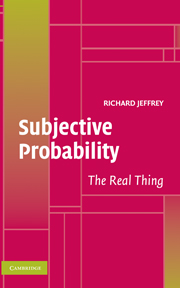3 - Probability Dynamics; Collaboration
Published online by Cambridge University Press: 05 June 2012
Summary
We now look more deeply into the matter of learning from experience, where a pair of probability assignments represents your judgments before and after you change your mind in response to the result of experiment or observation. We start with the simplest, most familiar mode of updating, which will be generalized in sec. 3.2 and applied in sec. 3.3 and 3.4 to the problem of learning from other people's experience-driven probabilistic updating.
Conditioning
Suppose your judgments were once characterized by an assignment (“old”) which describes all of your conditional and unconditional probabilities as they were then. And suppose you became convinced of the truth of some data statement D. That would change your probabilistic judgments; they would no longer corrrespond to your prior assignment old, but to some posterior assignment new, where you are certain of D's truth.
Certainty:new(D) = 1
How should your new probabilities for hypotheses H other than D be related to your old ones?
The simplest answer goes by the name of “conditioning” (or “conditionalization”) on D.
Conditioning:new(H) = old(H|D)
This means that your new unconditional probability for any hypothesis H will simply be your old conditional probability for H given D.
When is it appropriate to update by conditioning on D? It is easy to see–once you think of it–that certainty about D is not enough.
Information
- Type
- Chapter
- Information
- Subjective ProbabilityThe Real Thing, pp. 51 - 61Publisher: Cambridge University PressPrint publication year: 2004
